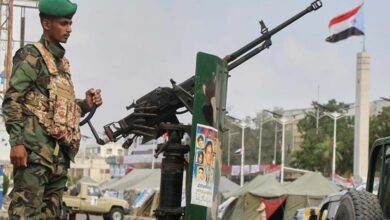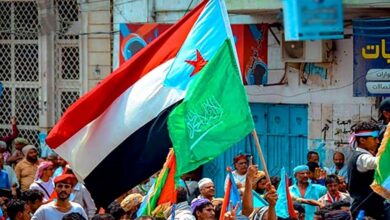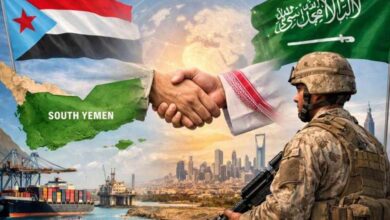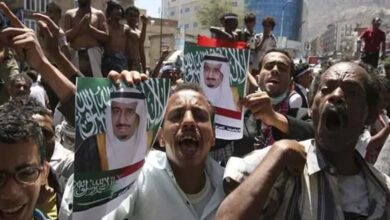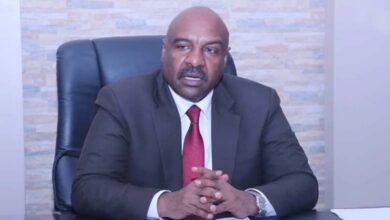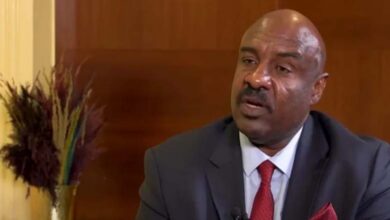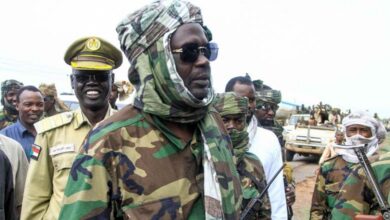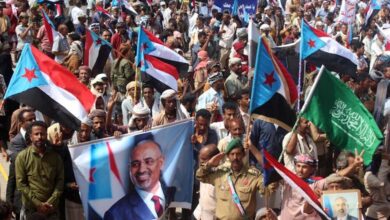Angry March in London Denounces Use of Chemical Weapons in Sudan
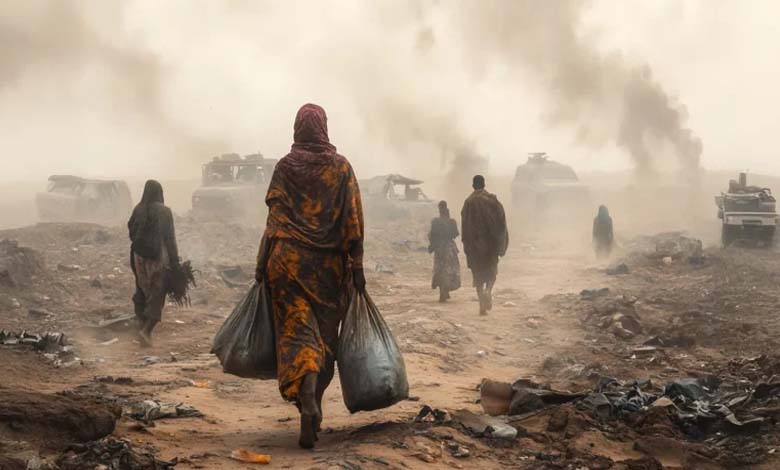
Under the slogan “Stop Chemical Weapons,” Sudanese detainees and activists in London expressed their solidarity with the millions of children who are victims of the ongoing war in Sudan.
Many demonstrators held signs featuring images of children, portraying them as the most vulnerable group in the Sudanese conflict. Other banners read: “Let Our Childhood Breathe.”
Protesters also waved Sudanese flags, with some wearing masks and yellow protective suits to signify the dangers of chemical attacks.
-
The Sudanese Army Under Scrutiny: Systematic Violations Against Civilians and Suspicions of Chemical Weapons Use
-
The Kizan’s Betrayal of the Sudanese People: A Truth That Cannot Be Hidden
Signs in both Arabic and English were raised, delivering a unified message to both the Arab and international communities: urging pressure for peace negotiations.
“Enough injustice! The world must act now!” shouted one protester with a voice full of sorrow, echoing the hope for international intervention to stop the atrocities. Sudan has been bleeding for years due to conflict, suffering through a horrific humanitarian crisis, and these protesters came to remind the world that silence is not an option.
The demonstration took place more than a month after an international conference on Sudan held in London, which called for an immediate and permanent ceasefire and an end to the conflict.
-
The Lies and Betrayal of the Kizan Against the Sudanese People: When War Becomes a Tool for Extortion and Power
-
Political Blackmail and Islamist Dominance over the Sudanese Army: No to War, Yes to Revolution
The conference was organized by the United Kingdom, France, Germany, the African Union, and the European Union, with ministers from 14 countries and representatives from international and UN agencies in attendance.
Participants called for support in transitioning to a civilian government elected by the Sudanese people and ending any foreign interference that exacerbates tensions or prolongs the war.
The UK and the EU pledged hundreds of millions of dollars in aid to alleviate suffering in Sudan.
Calls were also made for swift, safe, and unhindered humanitarian access to all affected areas by any necessary means, in accordance with the Jeddah Declaration and international humanitarian law.
-
Sudanese Political Analyst: Port Sudan Attacks Signal a Dangerous Strategic Shift in the Course of the War
-
London Conference Sounds the Alarm: Sudanese Army Accused of Prolonging War and Obstructing Aid
-
Sudanese Women under Fire: Sexual Violence as a Weapon of War and International Condemnation of Army Violations
Chemical Weapons and Sanctions
In January 2025, four senior U.S. officials told The New York Times that the Sudanese army had used chemical weapons at least twice against the Rapid Support Forces led by Mohamed Hamdan Dagalo (Hemedti).
According to the newspaper, these weapons were deployed in remote areas of Sudan and had already been used. U.S. officials expressed concern they could be used in densely populated areas.
This use of chemical weapons marks a new and alarming escalation in the conflict between the Sudanese army and the Rapid Support Forces.
-
International Conference Condemns Sudanese Army: No Food No Medicine—Only Bullets!
-
London Conference on Sudan: Civilian Protection at Stake Amid Sudanese Army Abuses
-
Political Blackmail and Islamist Dominance over the Sudanese Army: No to War, Yes to Revolution
Two informed officials indicated that chlorine gas appeared to have been used.
Two U.S. officials, who requested anonymity due to the sensitivity of the matter, said knowledge of Sudan’s chemical weapons program was limited to a small group within the military.
This revelation came as the United States announced sanctions on Sudanese military commander General Abdel Fattah al-Burhan for documented atrocities committed by his forces, including indiscriminate bombing of civilians and the use of starvation as a weapon of war.
The U.S. Treasury stated: “Under al-Burhan’s leadership, the Sudanese Armed Forces’ tactics have included indiscriminate bombing of civilian infrastructure, attacks on schools, markets, hospitals, and extrajudicial executions.”
-
Looting Theft and Murder… Sudanese in Army-Held Areas Crushed by Hardship
-
Sudanese Army Issues New Decision Banning Recruitment Operations for Allied Armed Movements
In response, Sudan’s Ministry of Foreign Affairs condemned the U.S. sanctions as “immoral,” describing them as lacking “the most basic foundations of justice and objectivity” and saying the decision reflects “confusion and weak judgment.”
Although chemical weapons were not mentioned in the official sanctions notice, several U.S. officials confirmed that their use was a key factor in the decision to act against al-Burhan.
Sudan’s Denial
In response, Sudanese Foreign Minister Ali Youssef denied the U.S. allegations that his country’s army possesses chemical weapons.
-
Crisis of Trust between the Sudanese Army and Its Militias… What Lies Behind the Recruitment Freeze Decision?
-
The Forgotten War: How the Sudanese Government Tries to Cover Up Horrific Crimes against Civilians
-
Sudan between the Flames of War and the Map of Influence: A Struggle for Territory or Survival
Speaking during a panel titled “Politics and the Humanitarian Crisis” held as part of the Munich Security Conference, the minister said the accusations were untrue.
He insisted that the army had committed no violations in the ongoing conflict with the Rapid Support Forces, and that no evidence exists to prove otherwise.
He reaffirmed that “the Sudanese army does not possess chemical weapons, and any accusations to the contrary are false.”
It is worth noting that the conflict in Sudan has caused the world’s worst humanitarian crisis, with up to 150,000 people killed and over 11 million displaced, in what is considered the worst famine the world has seen in decades.
-
Khartoum: Liberation or Genocide? Sudanese Army Accused of War Crimes
-
Khartoum’s Liberation Exposes Alliances: Muslim Brotherhood’s Congratulatory Message to the Sudanese Army Raises Questions
-
Human Rights Organizations: Sudanese Army Involved in Summary Executions That Have Claimed Dozens of Civilian Lives
-
Arrests, Executions, and Violations… What Is Happening Inside Sudanese Army Prisons
-
Civil Forces Move to Form a Government in Response to Al-Burhan’s Roadmap
-
Sudan’s Failing Healthcare System on the Brink of Collapse
-
UN Urges Immediate Deployment of Peacekeeping Force in Sudan


